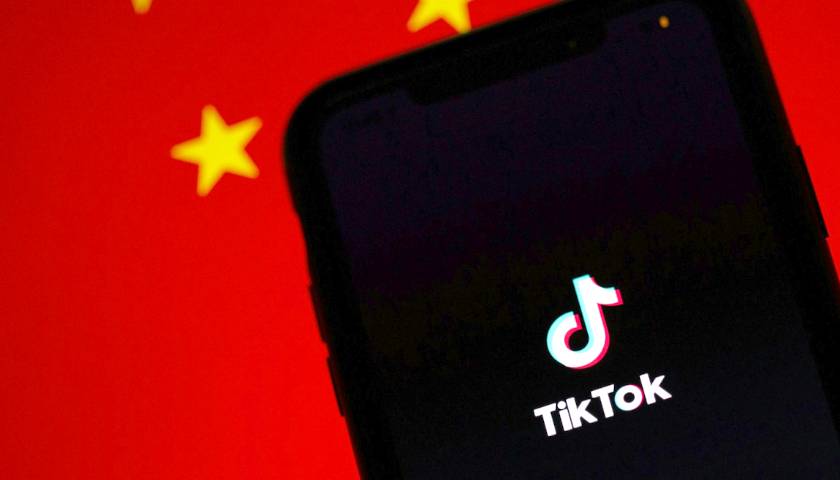by Steven Richards
Pressure is mounting in Washington to finally pass a bill requiring TikTok’s China-based parent company to divest of the popular social media app amid new revelations that the company is much closer to the Chinese government than it has previously claimed.
Now, the House has passed a comprehensive foreign aid package which included a revised TikTok divestment bill. This makes it more likely to become law sooner rather than later as the Senate is set to consider the legislation.
Last week, reports emerged showing TikTok maintained a close working relationship with its Chinese parent company despite public efforts to convey independence, may have exposed sensitive advertising data of U.S. companies, and congressional staff claimed the Chinese Embassy itself was helping to lobby against a forced divestment.
Senator Marco Rubio, a longtime critic of the app and proponent of a forced divestment, wrote in the pages of the New York Post last month after the House passed the first version of its TikTok divestment bill, arguing in support of the measure.
“I raised concerns about where it could go back in 2019 when it became apparent the Chinese Communist Party could — and almost certainly would — weaponize TikTok against America,” the senator wrote.
He noted that after he filed an initial bill to ban the app, TikTok proceeded to “flood” Washington with lobbyists and millions of dollars to protect itself.
“But congressional opposition to the app’s China ties has only grown broader and stronger,” he wrote. And, this trend has continued. The new revelations about TikTok’s actions and the Chinese embassy’s role in the campaign to prevent a divestment bill have seemed to galvanize support.
“The lobbying efforts of the Chinese Embassy reveal their true agenda, protecting TikTok as a strategic asset for Beijing and the Chinese Communist Party to influence the United States,” Rubio told Just the News on Thursday.
Last week, Fortune reported that several former employees of TikTok based in the United States said the company cooperated closely with its Chinese parent ByteDance and that public claims of independence were not entirely accurate.
Many of the employees wished to remain anonymous, however, one—who identified himself as Evan Turner—worked as a senior data scientist at TikTok from April to September in 2022 and had a front row seat to the company’s operations.
He told Fortune that TikTok obfuscated ByteDance’s role during his employment. Turner originally reported directly to a ByteDance executive based in China when he was first hired, however soon the company announced that it would store U.S. user’s data in the United States as pressure on the company mounted.
But, Turner says, he was only required to report to a Seattle-based executive on paper, but that human resources instructed him to continue to work with the ByteDance executive based in China. He told Fortune he never met with the Seattle executive and instead continued his job as normal.
As part of his role, Turner says he emailed spreadsheets to the ByteDance executive chocked full of data about hundreds of thousands of U.S.-based users of the TikTok app, including names, email addresses, IP addresses, location and demographic information. The company’s goal was to use this data to improve its algorithms and marketing.
“I literally worked on a project that gave U.S. data to China,” Turner told Fortune. “They were completely complicit in that. There were Americans that were working in upper management that were completely complicit in this.”
Then, last Wednesday, a Forbes investigation found sensitive advertising data of U.S.-based companies—ranging from small businesses to American giants like Amazon and Disney—was widely available to ByteDance staff in China.
Because programs used in the advertising department of TikTok were built by ByteDance, the China-based company had access to information about the American advertisers—including email addresses, financial agreements, and sensitive tax information. The databases also included marketing information and advertising plans.
“If you’re an advertiser advertising on this platform, your information [could] be accessed by global employees and distributed for other purposes,” one source from the TikTok advertising department told Forbes. “The advertiser platform was done in the Wild West and wasn’t done with the same things that maybe, let’s say, Meta or X have done to protect advertiser information from being shared.”
Sources interviewed by Forbes cited chaotic advertising division conditions for poor data practices and a cutthroat marketing and profit-seeking mentality that encouraged employees to share sensitive advertiser data with their rivals to squeeze out more revenue.
In addition, Chinese diplomats have met directly with Capitol Hill staff to lobby against the proposed TikTok legislation, revealing China’s direct interest in keeping the popular social media app under control of a company based in the country.
According to Politico, Chinese Embassy staff scheduled meetings with Hill offices after the House passed the TikTok divestment bill in March. Initially, the embassy obscured the reason for the meetings, but downplayed national security concerns about the app and warned that banning the app would be harmful to U.S. investors, staffers told Politico.
The staffers told Politico the embassy attempted to claim TikTok as a Chinese company, even as the social media platform sought to project its independence and assuage concerns from lawmakers.
These three revelations have shown TikTok may have a much closer relationship with both its parent company ByteDance and the Chinese government than it has publicly claimed.
TikTok CEO Shou Zi Chew has repeatedly insisted TikTok remains independent of the Chinese government.
“Maybe our trust starting line is behind other businesses, but I also think that there are very serious approaches that we’ve taken to try and earn that trust and to close that gap,” Chew said. He claimed TikTok’s efforts to safeguard U.S. user data, be transparent and “not be manipulated by any government,” show this.
Chew previously declined to answer questions from journalists about whether or how much influence China has over the company.
TikTok did not respond to a media inquiry from Just the News on Friday.
The TikTok divestment bill has become part of a larger foreign aid package which passed the House over the weekend. The legislation only has one significant change from the original, it extends the time TikTok would have to find a new owner from six months to one year. The Senate could vote on the measure as soon as next week. President Biden has already indicated that he would sign the bill.
– – –
Steven Richards is a reporter at Just the News.
Photo “TikTok app” by Solen Feyissa.




